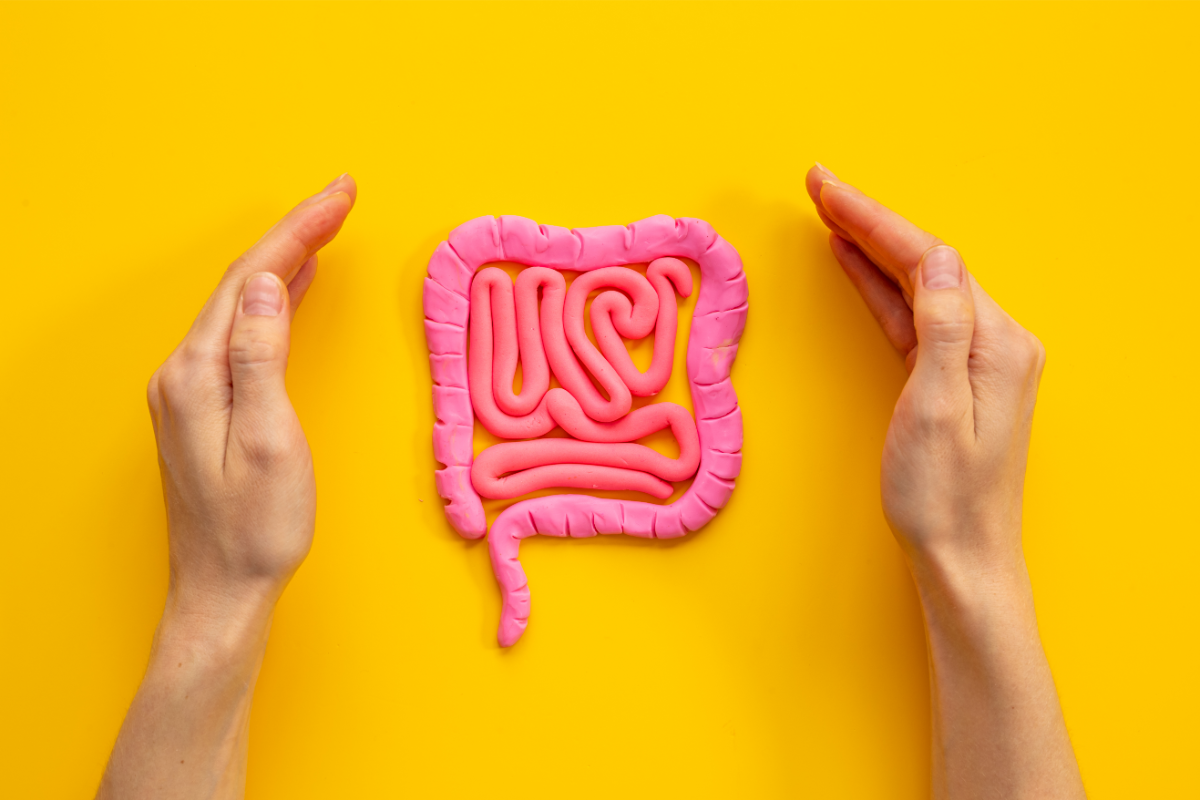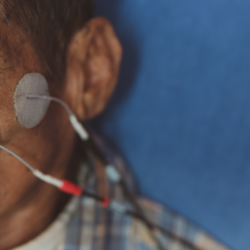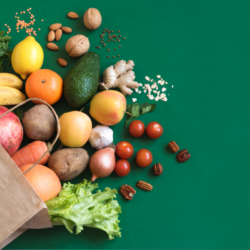Haemorrhagic rectocolitis is a chronic inflammatory bowel disease (or IBD). IBD is a group of diseases that affect the gastrointestinal tract.
What is RH?
This severe inflammation produces tiny sores called ulcers on the wall of the colon. In fact, the inflammation generally starts in the rectum and spreads upwards. However, it can affect the whole colon.
In haemorrhagic rectocolitis, the intestine moves its contents very quickly and empties frequently. In addition, the death of cells on the surface of the intestinal mucosa leads to the formation of ulcers. This can lead to bleeding and discharges of mucus and pus. Although the condition affects people of all ages, most people develop UC between the ages of 15 and 30. After the age of 50, there is another slight increase in IBD diagnoses, usually in men.
What causes ulcerative colitis?
Unfortunately, the exact cause of ulcerative colitis remains unknown. Previously, diet and stress were suspected causes. Doctors now know that these factors can aggravate the disease, but are not the cause.
One possible cause is a dysfunction of the immune system. In fact, when the immune system tries to fight an invading virus or bacteria, an abnormal immune response means that the same system also attacks the cells in the digestive tract. Heredity also seems to play a role in that RH is more common in people with family members who have the disease. However, most people affected by the condition have no family history.
What are the symptoms?
The symptoms of RH can vary, depending on the severity of the inflammation and where it occurs. In brief, signs of the condition may include:
- Diarrhoea, often mixed with blood or pus
- Abdominal pain and cramps
- Rectal pain
- Rectal bleeding – discharge of a small amount of blood with the stool
- Urgency to defecate
- Inability to defecate despite urgency
- Weight loss
- Fatigue
- Fever
- Growth retardation in children
Haemorrhagic rectocolitis can also cause other symptoms such as
- Joint pain
- Swelling of the joints
- Nausea and reduced appetite
- Skin problems
- Mouth sores
- Eye inflammation
However, most people with ulcerative colitis have mild to moderate symptoms. What’s more, the course of ulcerative colitis can vary. Some people experience long periods of remission.
How is ulcerative colitis diagnosed?
Haemorrhagic rectocolitis is a form of inflammatory bowel disease. Diagnosis involves a rigorous approach and several key tests.
- Stage 1: Consultation and clinical examination It all starts with a thorough consultation. The doctor collects the symptoms and carries out a physical examination focusing on the abdomen and anal area.
- Stage 2: Laboratory tests Blood tests reveal signs of inflammation and anaemia, while stool tests help rule out infections that mimic the symptoms of ulcerative colitis.
- Stage 3: Colonoscopy and biopsy Colonoscopy is crucial. It provides a detailed view of the colon and rectum. Tissue samples, or biopsies, are taken for histological analysis.
- Stage 4: Specialised imaging Tests such as entero-MRI or entero-scan provide precise images of the extent of intestinal inflammation and detect complications.
- Stage 5: Sigmoidoscopy This examination focuses on the lower part of the colon and is often used to complement colonoscopy.
- Stage 6: Endoscopic videoscopy Videoscopy is sometimes required to examine the small intestine, which is beyond the reach of other endoscopic techniques.
What are the risk factors?
Ultimately, rectocolitis affects roughly the same number of women and men. Risk factors can include:
Age: The disease usually starts before the age of 30. However, it can occur at any age, and some people may not develop the disease until they are over 60.
Race or ethnic origin: Caucasians are 2 to 5 times more affected by haemorrhagic rectocolitis than blacks or Asians. At the same time, the Jewish community (Ashkenazi Jews) is 4 to 5 times more affected by the disease than other groups.
Family history: The risk is higher when a close relative, a brother or sister or a child, has the disease themselves.
What complications can arise from the disease?
The possible complications of rectocolitis are as follows:
- Heavy bleeding
- Perforation of the colon
- Severe dehydration
- Bone loss (osteoporosis)
Inflammation of the skin, joints and eyes - Increased risk of colon cancer
- Rapid swelling of the colon
- Increased risk of blood clots in the veins and arteries
How to manage flare-ups of HR?
Managing flare-ups of haemorrhagic rectocolitis (UC) is crucial to reducing symptoms and maintaining an acceptable quality of life for patients. Here’s a structured approach:
Drug therapies
- Anti-inflammatories: Aminosalicylates are frequently prescribed to reduce inflammation.
- Corticosteroids: Used in moderate to severe flare-ups for a rapid effect on inflammation.
- Immunosuppressants: These drugs reduce the body’s immune response and are used when patients do not respond to other treatments.
- Biological agents: These specifically target certain proteins involved in inflammatory processes.
- Small molecules: JAK inhibitors are an option for adult patients with moderate to severe UC.
Lifestyle and dietary changes
- Diet: Adopting a low-residue diet can reduce the frequency of bowel movements and abdominal pain.
- Hydration: Drink enough water to compensate for losses due to diarrhoea.
- Avoid irritants: Limit consumption of spicy foods, alcoholic beverages and caffeinated drinks, which can aggravate symptoms.
Psychological support
- Psychological support: Stress can trigger or aggravate flare-ups. Relaxation techniques and psychological support can help.
Treatment of complications
- Supplements: Deficiencies, particularly of iron, are common; supplements may be required.
- Increased monitoring: Severe relapses may require hospitalisation for more intensive treatment.
What is the difference between Crohn’s disease and ulcerative colitis?
Crohn’s disease and haemorrhagic rectocolitis (UC) are both forms of chronic inflammatory bowel disease (IBD), but they have distinct characteristics:
Location of inflammation:
- Crohn’s disease: Inflammation can occur anywhere in the gastrointestinal tract, from the mouth to the anus, and affects all layers of the intestinal wall.
- Haemorrhagic Rectocolitis: Inflammation is generally limited to the colon and rectum, affecting only the innermost layer (mucosa).
Nature of inflammation :
- Crohn’s disease: Inflammation is often discontinuous, with healthy areas interspersed with diseased areas, and may form fissures or fistulae.
- Haemorrhagicrectocolitis: Inflammation is continuous, starting in the rectum and sometimes spreading throughout the colon, without healthy intervals.
Symptoms :
- Crohn’s disease: Symptoms include abdominal pain, sometimes bloody diarrhoea, weight loss and extra-intestinal symptoms.
- Haemorrhagic rectocolitis: The main symptoms are bloody stools, abdominal cramps and faecal urgency.
Complications:
- Crohn’s disease: Complications such as intestinal obstructions, abscesses and fistulas are more common.
- Haemorrhagic Rectocolitis: Increased risk of fulminant colitis, colon cancer and megacolon toxicity.
Treatment:
Although certain treatment options can be used in both conditions, such as immunosuppressants and biological agents, the treatment strategy may vary depending on the location and severity of the inflammation.
In summary, although Crohn’s disease and UC are similar in their designation as IBD, they differ markedly in their location, nature of inflammation, symptoms, complications and treatment strategies. Understanding these differences is essential for the accurate diagnosis and appropriate management of each condition.
What diet should I follow for ulcerative colitis?
When it comes to ulcerative colitis (UC), diet plays a key role in managing symptoms and flare-ups. Although dietary needs may vary from person to person, here are some general guidelines to consider:
Preferred foods :
- Foods rich in omega-3s: Studies suggest that omega-3s, found in oily fish such as salmon and mackerel, may have anti-inflammatory effects.
- Cooked fruit and vegetables: Cooking helps to break down the fibre, making these foods easier to digest.
- Sources of lean protein: Skinless poultry, fish and tofu are good options.
- Adequate hydration: Drinking enough water is crucial, especially if diarrhoea is a symptom.
Foods to limit or avoid:
- Foods rich in insoluble fibre: Such as wholegrain cereals, which can aggravate diarrhoea and inflammation.
- Spicy foods and trans fats: These can irritate the colon and cause or worsen symptoms.
- Alcohol and caffeine: These substances can increase diarrhoea and fluid loss.
- Dairy products: Some people may be lactose intolerant and find relief by limiting dairy products.
General advice:
- Frequent small meals: Rather than large meals, eating small amounts can help reduce the load on the digestive system.
- Food diary: Keep a diary to identify foods that aggravate symptoms.
It’s important to note that diet needs to be tailored individually, and what works for one person may not be suitable for another. Working with a healthcare professional, such as a dietician, is essential to developing a personalised, balanced diet plan.
Is haemorrhagic rectocolitis hereditary?
UC is a complex condition influenced by a number of factors, with genetics playing a significant role. Research indicates that individuals with first-degree relatives (such as a parent or sibling) with UC have a higher risk of developing the disease themselves.
Although the presence of certain genes can increase susceptibility to UC, it is essential to note that genetics is only part of the equation. Environmental and lifestyle factors, such as diet, stress and exposure to certain infectious or non-infectious agents, can also contribute to the onset and progression of the disease.
It is therefore possible to conclude that UC may have a hereditary component, but it is not directly transmitted in a Mendelian fashion like certain other genetic conditions. Genetic predisposition, combined with environmental factors, determines the overall risk of developing this inflammatory bowel disease.
For those with a family history of UC, it may be beneficial to discuss monitoring and potential preventive strategies with a healthcare professional. This may include regular check-ups, dietary and lifestyle modifications, as well as discussions about which symptoms to look out for for possible early intervention.
Natural solutions to adopt quickly
Although haemorrhagic rectocolitis (HR) is a chronic condition that often requires regular medical monitoring, adopting natural solutions can play a significant supportive role in managing its symptoms. These natural methods can contribute to a better intestinal balance and help maintain a longer-lasting remission.
What is the role of probiotics?
A 2019 study looked at how people with UC responded to the use of probiotics. In fact, researchers found that 57% of people who took probiotics reported an overall positive experience. What’s more, 50% noted an improvement in their symptoms, including stool frequency and texture.
Do plants have a place in HR management?
A 2019 study highlighted several natural substances that may reduce UC symptoms, including:
andrographis paniculata extract
aloe vera gel
wheatgrass juice
plantago ovata seeds
boswellia serrata gum resin
In fact, the authors suggest that certain specific compounds in these herbal remedies support immune activity and provide antioxidants that reduce inflammation.
However, the study does not recommend any of these substances as a stand-alone treatment. It is therefore important to stress that people with UC should use them as a complementary treatment to traditional medicines.
FAQ
1. Is haemorrhagic rectocolitis curable?
There is no cure for ulcerative colitis, but it can be managed with appropriate treatment.
2. Can ulcerative colitis lead to cancer?
People with ulcerative colitis have an increased risk of developing colon cancer, so it’s important to have regular screening tests.
3. Can people with ulcerative colitis have children?
Yes, people with ulcerative colitis can have children. However, it is important to discuss any potential risks to pregnancy with a doctor.
4. Is ulcerative colitis hereditary?
Haemorrhagic rectocolitis may have a genetic component, but it is not necessarily inherited.
5. Can ulcerative colitis affect quality of life?
Haemorrhagic rectocolitis can have a significant impact on quality of life, due to the symptoms associated with the disease. However, appropriate treatment can help to improve quality of life.
In conclusion, ulcerative colitis is a chronic inflammatory bowel disease that can have a significant impact on quality of life. Early diagnosis and treatment are essential to control symptoms and prevent complications. With appropriate treatment and a healthy lifestyle, people with ulcerative colitis can live normal, productive lives.
Source:
https://www.ameli.fr/assure/sante/themes/rectocolite-hemorragique
https://www.ncbi.nlm.nih.gov/pmc/articles/PMC4511685/
https://www.ncbi.nlm.nih.gov/pmc/articles/PMC3273725/
https://pubmed.ncbi.nlm.nih.gov/7066192/
https://www.sciencedirect.com/science/article/pii/S2213434418301075
https://www.ncbi.nlm.nih.gov/pmc/articles/PMC6540767/





